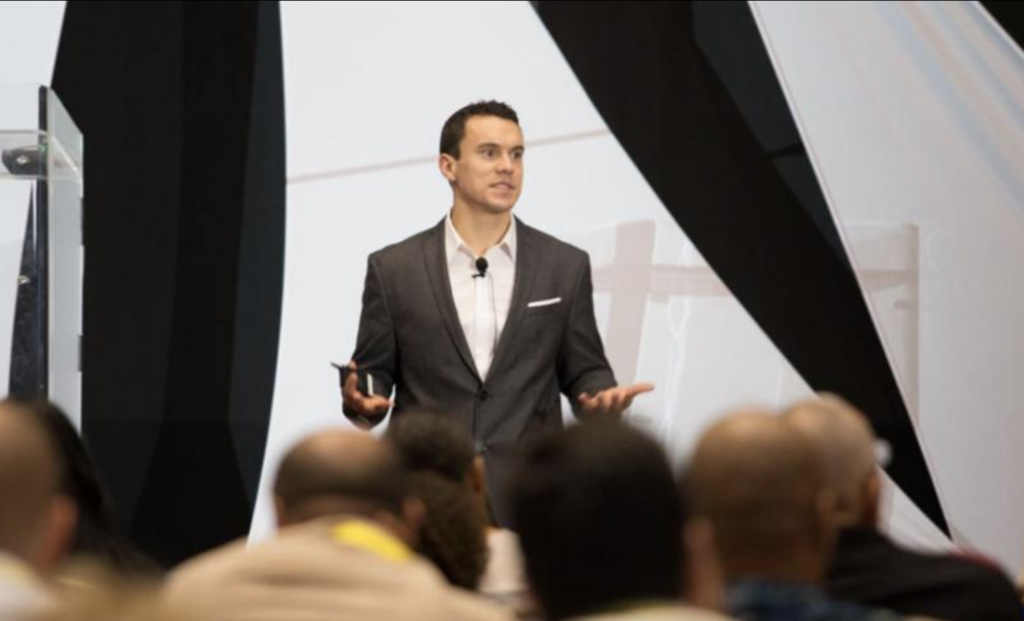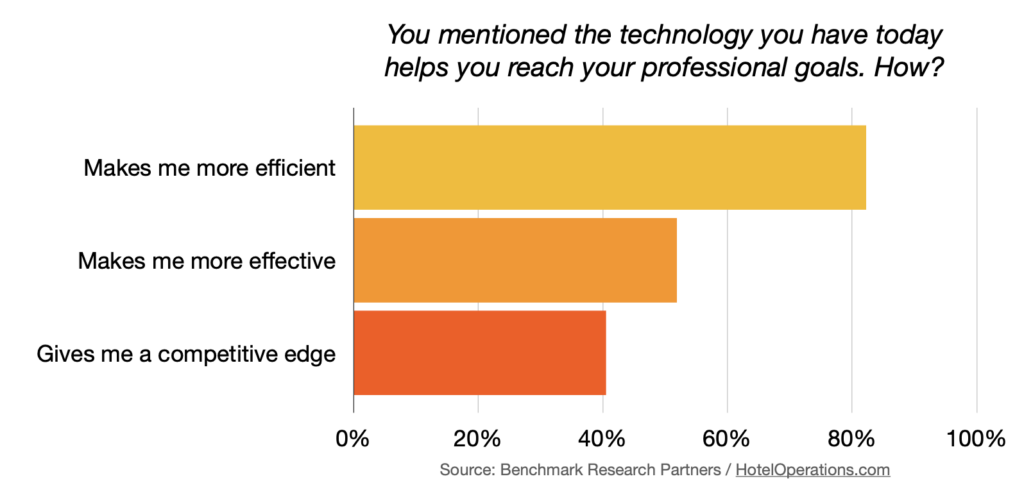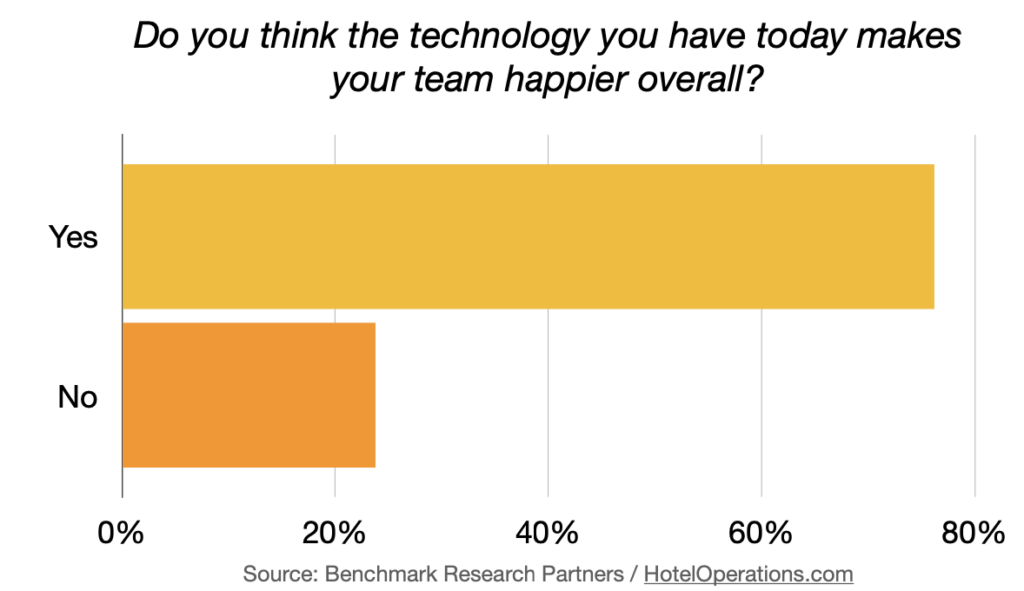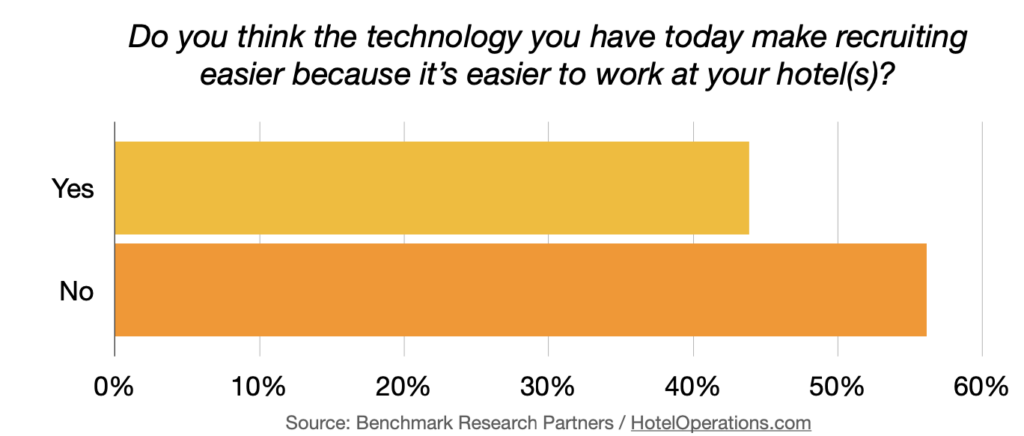Automation could have made my life a lot easier when I worked at the front desk years ago. Often, I’d be the only person on the property and had to balance the check-in queue with guest communication and a million other things. Since then, I have spent a decade helping tens of thousands of hotels around the world use technology for automation, and I wanted to put everything I’ve learned into a guide on using automation in hotel operations today.

In this guide, we’ll define what automation is and does, look at research on automation in hotels today, see what hotel industry experts are saying about automation for 2023, and finally look at examples of hotel automation in action from leading operations executives at brands around the world.
Let’s start off by defining what we’re talking about…
What is hotel automation?
Hotel automation is the use of technology for turning manual tasks into digital processes that require little or no staff time within a hotel business.
Examples include reporting, guest check-in / check-out, and upselling campaigns.
The goals of hotel automation include saving time, ensuring important processes are consistently followed, freeing staff to focus on higher-value activities, and increasing the profitability of the hotel operation by saving money.
Research on automation in the hotel industry today
I recently surveyed hoteliers on how they’re using technology, and a few things stood out:
80% of hoteliers say automation is making them more efficient

Automation is making hotel staff happier

A big reason for this is that automation saves time and eliminates tedious, repetitive tasks.
Automation presents a recruiting opportunity
Nearly half of the study respondents said technology is making recruiting easier because it’s easier to work at hotels that use automation.

Today, you can hire from a broader pool of candidates. Previous industry experience is less important for more roles as technology supports many elements of hotel operations today.
“Systems break down when you don’t have automation” (Anthony Melchiorri)
I appreciated hearing Anthony Melchiorri and Glenn Haussman share their perspective on a recent episode of the No Vacancy Show:
A few things that stood out to me:
- Glenn (4:47): “One of the things that we’re looking forward to in 2023 is that continual refinement of our processes at hotels. It’s a little bit boring on the surface, but it’s really essential because as we’re reaching the peaks of what we could really charge guests it’s becoming more incumbent on us to find ways to lower expenses. Employees aren’t getting any less money because we value them, we’ve got to pay them more. Goods and services are becoming more expensive, and our ability to earn is becoming more challenging.”
- Anthony (16:36): “The whole system breaks down when you don’t have an automated system that everybody buys into. And unfortunately, typically when I take over a hotel, that’s my number one problem.
Operational costs are rising while the ability to charge higher room rates is ebbing making new strategies key to success in 2023. Hoteliers are leveraging automation to lower costs to create increased bottom line profitability.
Glenn Haussman
“Automation will become the way of doing business” (Max Starkov, Adjunct Professor of Hospitality Technology, NYU)
“In 2023, automation in the hospitality industry will become the way of doing business,” Max wrote in his 2023 predictions article. “I believe there are two macro socio-economic factors forcing the hospitality industry to accelerate the adoption of contactless, human-less, and do-it-yourself (DIY) services and increase their technology investments in automation: the labor shortages in hospitality (1.5 million open positions in travel, hospitality, and leisure in Q4 2022) and the emergence of the new tech-savvy travel consumer.”
“Do guests expect human-provided services at hotels? I believe the notion that guests are demanding human-provided services is greatly exaggerated, especially today. A great example of why guests do not care about human-provided services as much as some in our industry think comes from the short-term rental sector, where the “gold standard” is customer experience without any human contact between guests and hosts, and yet guests are not only not complaining, but gobbling up this “human-less” service and loving it!”
With this context, let’s take a look at some advice and use cases from hotel executives around the world…
Start small (Ong Kok Hui, Director, Sunway Hotels & Resorts)
Sunway Hotels began its journey to automation with something very simple: the process for requesting shift changes.
“Something as simple as requesting a shift change used to require multiple paper forms and going from department to department to get signatures for approval,” Group Director of IT Ong Kok Hui told me.
He knew digitizing processes like these would result in a better experience for everyone. Since hotels operate 24 hours a day, requiring signatures in person from people on eight-hour shifts wasn’t practical.
“Working together with our team of developers we were able to create a solution, customize it for use in our hotel, and roll it out to our various departments. It didn’t require in-person interaction and could run 24 hours a day. After rolling that out, we became far more efficient. Paper didn’t go missing, and we had an official record of everything. That was 18 years ago but was our first major step forward in our journey towards digitization and automation.”
Automate reporting (Zach Cunningham, Vice President, Remington Hotels)
“Everyone used to spend so much time on reporting. I remember watching our team go through printouts with highlighters,” Remington Hotels’ VP of Analytics Zach Cunningham told me. “We knew there had to be a better way.”
This realization led Zach and his team to develop a proprietary business intelligence platform powered by Microsoft’s Power BI, and today everyone in their organization from front-line managers to owners has real-time, customizable reporting at their fingertips.
“Reporting used to be based on data that was manually typed into Excel. We had people spending 10 hours every single day typing numbers into reports. Now with automation that’s completely gone. This efficiency frees our teams to do much higher-level work. The cost savings is something our owners appreciate as well. It shows we are focused on operational efficiency.”
Zach Cunningham
Automate hotel operations, not guest communication (Scott Curran, Chief Operating Officer, Reneson Hotels)

Scott Curran, Chief Operating Officer of Reneson Hotels, has found it most effective to focus on automating operations instead of guest communication.
“We’re hearing from lots of other hoteliers that using bots for communication causes a lot of problems for their staff. Guests are asking questions and the staff doesn’t even know what they were talking about because the bot had responded in some way that didn’t make sense.”
“We’ve chosen to look at ways to automate operations to free up time for hotel staff instead of using it for guest communication.”
Scott Curran
To illustrate this, Scott shared the example of some of his hotels that have 8+ weddings a weekend. As you might imagine, everyone shows up early and wants to check into the room early.
“For early check-in requests, hotels typically say ‘Come back at 3 pm, and we can check you in. But as a traveler – especially one with kids – that’s the worst thing you can hear and not a great way to start your hotel stay. We wanted to fix this.”
“We built a workflow with automation so our associates can enter the early check-in request and it automatically texts the guest: ‘We’ve received your request for 11 am, and have started to work on this. You’ll get a text when it’s done.’ That notification then goes directly to the head housekeeper. Whoever is responsible for cleaning the room marks it is done once it’s ready, which triggers a text message to the guest that says, ‘Come back to the front desk, your room is ready.’”
“This allows our front desk agent not to have to run around and try to remember the status of everything. If I’m that person checking in, I’m going to go get a coffee or something to eat because I feel good about the fact that nobody will forget me and I’ll know the instant my room is ready.”
Automation reduces friction for guests (Jason Kaminski, Regional Director, American Liberty Hospitality)
Jason Kaminski has a fascinating story about launching an in-house F&B brand at American Liberty Hospitality to compete with Uber Eats, and his approach to automation is interesting to me. Part of launching this new brand involved requiring less from staff through the use of technology.
“Guests can become the order-taker and we don’t need a third party involved. With staffing being a challenge across the industry, it doesn’t make sense for them to just answer the phone.”
After the guest submits an order and pays for it, the order goes straight to the kitchen and into an automated workflow for staff to process. “It takes down barriers and extra friction in the room service order process and puts the guest in control.”
While Jason and his team are looking to use technology to speed up the process, they’re not looking to take humanity out of hospitality. In his view, humanity isn’t taking the order, it’s delivering the food in a way that feels efficient for guests.
Automate for efficiency and more revenue (Matthew Milliken, General Manager, The Mandolay Hotel)
Matthew Milliken, Managing Director of The Mandolay Hotel in the UK, often finds himself looking for efficiency in his own travels. “Sometimes I just want to get to my room – the less interaction the better when I’m tired.”
Observing this in himself and many of his guests – combined with a need to operate with fewer staff – led Matthew on a journey to look for ways automation could make them more efficient and drive revenue.
After adopting a new automated check in/check out application, The Mandolay Hotel saw benefits across its operation, starting with efficiency for the staff.
“Our team would be a lot more burdened if we didn’t have this.”
Both staff and guests like the new check in process, as it speeds up the process for both. Instead of worrying about dozens of people staying in reception trying to check in at the same time, there’s now a separate area for those who pre-registered, and they just need to show their ID to get the key. “It’s a lot more simple now,” he told me.
But equally importantly, he’s implemented automation for his upselling process, which eliminates the need to use staff time for this or rely on them following the process. “We’ve gone from upselling a couple of hundred pounds a month to £2000+ last month. The system pays for itself – it’s a no-brainer.”
Free your staff to serve (Kush Kapoor, CEO, Roseate Hotels)

For Roseate Hotels CEO Kush Kapoor, the opportunity for technology is to make things more efficient behind the scenes and free up the staff to provide a more human, caring experience.
One of the first examples of doing that was getting rid of paperwork. “Everything is on a tablet for our teams now,” Kush shared. Servers are able to push a button when taking an order at their restaurant and the chef in the kitchen is instantly notified. They no longer need to walk into the kitchen and explain the order to the chef. “This means they can spend more time with the guest, which leads to higher guest satisfaction because they’re giving more personal attention.”
Roseate staff sees the benefits. “If you ask anyone on my food and beverage team, they’re much happier now.”
Kush believes automation can create a positive flywheel that drives the business forward. “You can only make a guest happy if your staff is happy, and you can only make your staff happy if they’ve got the best resources – and the best resources are driven by technology.”
“This all leads to more revenue and more profitability, driving the business – and our growth goals – ahead.”
Kush Kapoor
What could hotel automation do for you?
As we’ve looked at here, hotel automation can save time for your staff, allow them to focus on higher-value activities, and make life easier for your guests.
What’s been your experience with automation? Share your experience here on our LinkedIn page – I’d love to hear from you.









